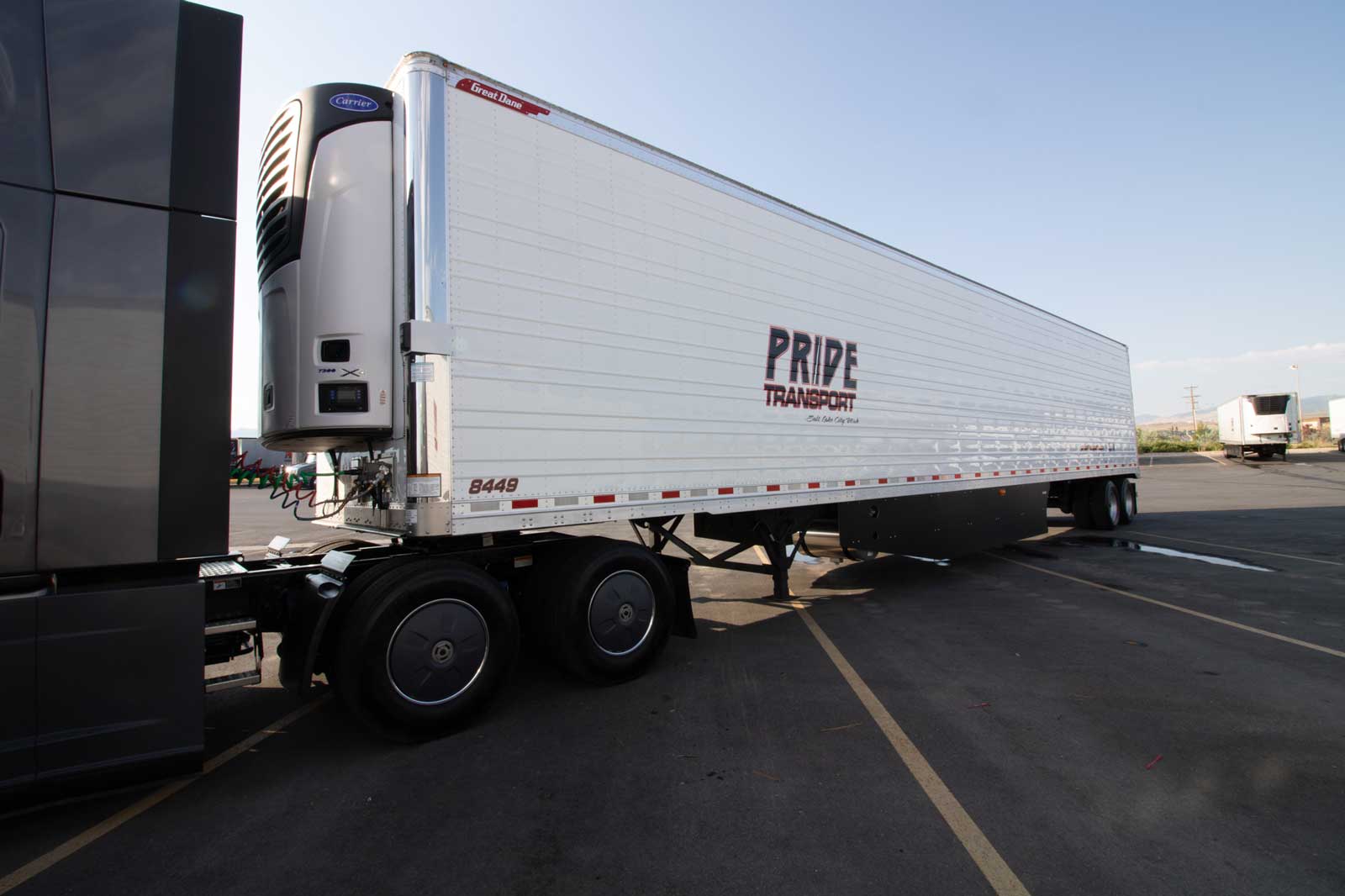Thermo King Truck Refrigeration Units: Best Alternatives for Temperature Level Control
Thermo King Truck Refrigeration Units: Best Alternatives for Temperature Level Control
Blog Article
Top Advancements in Transportation Refrigeration: Enhancing Effectiveness and Security
The landscape of transportation refrigeration is undertaking substantial transformation, driven by developments aimed at improving both performance and safety and security. As these innovations proceed to advance, it is necessary to explore their implications on functional techniques and regulative compliance, triggering a better evaluation of exactly how they improve the future of transport refrigeration.
Smart Temperature Keeping Track Of Equipments
In the world of transport refrigeration, wise temperature level monitoring systems have arised as a critical innovation for making certain the honesty of temperature-sensitive items. These sophisticated systems utilize Web of Points (IoT) innovation to provide real-time information on temperature level variations, enabling drivers to preserve optimal conditions throughout the supply chain. By continually tracking the temperature of refrigerated containers and lorries, companies can swiftly recognize deviations that may jeopardize product quality.

Moreover, clever surveillance systems typically integrate automated notifies and notifications, allowing stakeholders to react immediately to any kind of prospective issues. This aggressive technique not just minimizes the risk of perishing however also improves conformity with regulative requirements governing food safety and pharmaceutical transport.
The assimilation of information analytics within these systems also facilitates predictive upkeep, helping operators to foresee potential devices failings prior to they occur. This ability reduces downtime and optimizes operational performance, inevitably causing set you back savings.
Eco-Friendly Refrigerants
Smart temperature level monitoring systems play an essential role in maintaining product quality, yet the effectiveness of transportation refrigeration also pivots on the selection of refrigerants used. As environmental problems rise, the shift towards green cooling agents has actually become essential. Traditional cooling agents, such as hydrofluorocarbons (HFCs), are notorious for their high Global Warming Prospective (GWP), contributing substantially to climate adjustment. On the other hand, arising alternatives like hydrocarbon-based cooling agents and hydrofluoroolefins (HFOs) present lower GWP alternatives, using both effectiveness and sustainability.
These green refrigerants not only reduce environmental impact however likewise align with worldwide laws focused on phasing out dangerous materials. Their adoption can result in enhanced energy effectiveness, ultimately minimizing operating costs for transportation refrigeration systems. The use of all-natural refrigerants, such as ammonia and carbon dioxide, has obtained grip due to their superb thermodynamic residential properties and lower environmental impact.
Buying environment-friendly cooling agents is not just a regulatory compliance action; it stands for a strategic choice that boosts brand credibility and promotes customer loyalty. refrigerated transportation thermo king. By focusing on lasting techniques, companies can add to a greener future while making certain the honesty of delivered products
Advanced Insulation Materials
Using advanced insulation materials is vital for maximizing transportation refrigeration systems, as they substantially enhance power performance and preserve consistent temperature control. Traditional insulation approaches typically drop brief in protecting against thermal transfer, leading to boosted power intake and varying temperature levels within refrigerated areas.
Arising materials such as vacuum cleaner shielded panels (VIPs) and aerogels provide premium thermal resistance, enabling thinner profiles without endangering performance. VIPs, for example, utilize a vacuum cleaner layer to minimize conductive and convective warmth transfer, making them optimal for space-constrained applications. Aerogels, recognized for their lightweight and permeable structure, supply extraordinary insulation while significantly decreasing general system weight.
Furthermore, incorporating phase modification products (PCMs) right into insulation systems can better support temperatures throughout transportation. These products take in and release thermal power, efficiently buffering versus outside temperature variants.
The integration of these innovative insulation products not just lowers the operational costs associated with power usage yet likewise extends the rack life of temperature-sensitive products. As the transport refrigeration sector proceeds to develop, the fostering of ingenious insulation innovations will certainly be crucial in enhancing both effectiveness and safety in cooled transport.
Automated Path Optimization
The efficiency of transport refrigeration systems is greatly enhanced via automated path optimization, which leverages innovative algorithms and real-time data to determine the most efficient paths for shipment. By analyzing numerous elements such as website traffic patterns, weather problems, and distribution windows, these systems more tips here can substantially decrease travel time and fuel usage.
Automated course optimization decreases human mistake and subjective decision-making, which can cause inefficiencies. This technology allows fleet supervisors to designate resources more successfully, making certain that chilled goods maintain their called for temperature throughout the journey. By enhancing routes, business can also improve customer complete satisfaction with prompt distributions.
Moreover, automated systems can adjust to unexpected conditions, such as road closures or sudden website traffic spikes, enabling dynamic rerouting. This versatility not just safeguards the integrity of temperature-sensitive products however also contributes to overall functional performance.
Applying automated route optimization can lead to substantial cost financial savings while decreasing the carbon footprint related to transportation. As businesses progressively prioritize sustainability, this development attracts attention as a vital part in modern-day transportation refrigeration, straightening functional goals with environmental obligation. Inevitably, automated course optimization stands for a substantial advancement in the mission for effectiveness and safety in transport refrigeration.

Real-Time Data Analytics
Automated route optimization substantially take advantage of the integration of real-time information analytics, which supplies critical insights into the performance of transportation refrigeration systems. By using real-time information, transportation operators can check temperature level changes and devices performance, guaranteeing that disposable products are maintained within needed criteria throughout transportation. This positive method not only boosts the high quality of the moved products but likewise mitigates the danger of wasting and loss.

In addition to enhancing effectiveness, real-time analytics boosts safety and security by making sure compliance with governing criteria for temperature control. This not just shields public wellness yet also strengthens a firm's track record - thermo king truck refrigeration units. As the transportation refrigeration market progresses, the combination of real-time information analytics becomes a cornerstone for driving technology, sustainability, and functional quality
Conclusion
In final thought, the innovations in transportation refrigeration considerably enhance both efficiency and safety and security within the industry. Smart temperature surveillance systems and real-time data analytics offer vital oversight, while environmentally friendly cooling agents and advanced insulation materials add to sustainability and energy effectiveness. Automated path optimization algorithms not just minimize traveling time but additionally decrease environmental impact. Jointly, these technologies stand for a vital advancement in transport refrigeration, guaranteeing compliance with governing standards and promoting a greener future.
The landscape of transportation refrigeration is undergoing substantial makeover, driven by advancements aimed at enhancing both efficiency and safety.Smart temperature tracking systems play an essential role in preserving item top quality, but the performance of transportation refrigeration likewise pivots on the option of cooling agents utilized. Their fostering can lead to boosted energy efficiency, ultimately decreasing operating costs for transportation refrigeration systems. Eventually, automated path optimization stands for a significant innovation in the pursuit for effectiveness and safety and security in transportation refrigeration.
In final thought, the advancements in transport refrigeration dramatically enhance both performance and security within the market.
Report this page